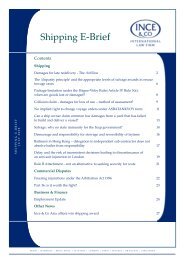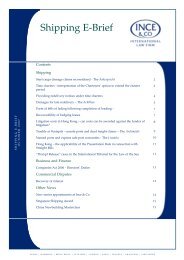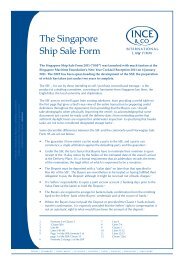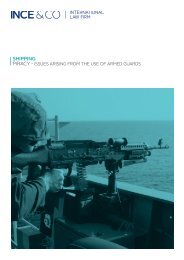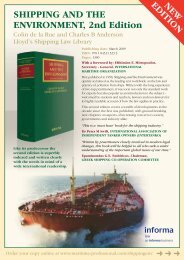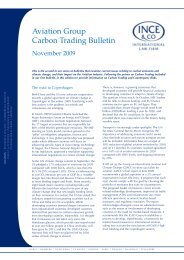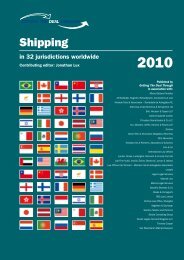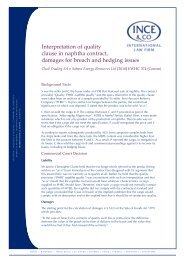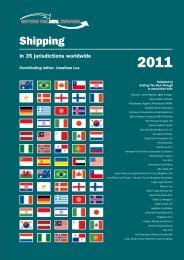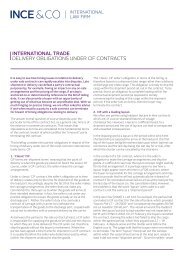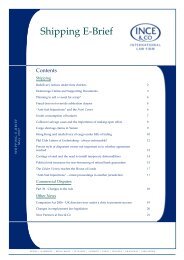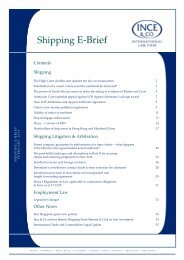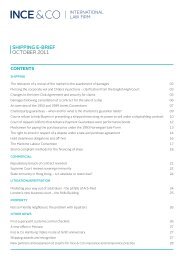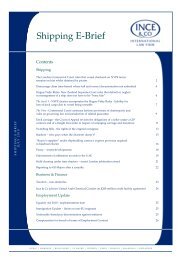Ince & Co Chinese Shipping E-brief August 2010 English Version
Ince & Co Chinese Shipping E-brief August 2010 English Version
Ince & Co Chinese Shipping E-brief August 2010 English Version
You also want an ePaper? Increase the reach of your titles
YUMPU automatically turns print PDFs into web optimized ePapers that Google loves.
grounding was caused by negligentnavigation and/or perils of the sea whichgave rise to defences under the HagueRules. As the Hague Rules do not apply inBrazil, the Hague Rules defences wouldnot be available to Owners before theBrazilian court.Mr Justice Flaux had little difficulty infinding that Owners were entitled to ananti‐suit injunction to prevent cargointerests from suing them abroad. Themore difficult question, and the one whichthis judgment addresses, is whether cargointerests could also be injuncted fromsuing third parties outside of England.This question arose because the Brazilianaction was also filed against Owners’managers, P&I insurers, charterers andsub‐charterers.Owners’ Case for an InjunctionIn asking the High <strong>Co</strong>urt to grant an antisuitinjunction restraining proceedingsagainst third parties, Owners relied onclause 3(b) of the bill of lading whichstated:1. that the merchant undertook not tobring any claims against anyservant, agent, stevedore orsubcontractor of the carrier (thecovenant not to sue);2. if it did, the merchant furtherundertook to indemnify the carrieragainst all consequences (thecircular indemnity clause); and3. that every servant, agent, stevedoreor subcontractor of the carriernevertheless had the benefit of allthe provisions in the bills benefitingthe carrier, including all limitationsof and exonerations from liabilityprovided to the carrier by law (theHimalaya clause).Owners argued that the third parties suedin Brazil were all either Owners’ servants,agents or sub‐contractors (within thedefinition in the bills of lading) and thatthe Cargo interests were bound by theircovenant not to sue, and Owners wereentitled to an injunction to enforce thecovenant.The Defence based on Art III r 8 and the<strong>Co</strong>urt’s DecisionThe Cargo interests contended that thecovenant not to sue in clause 3(b) was nulland void because it amounted toconferring on the third parties a blanketimmunity from liability, which would becontrary to Art. III r. 8 of the Hague Rules.Art. III r. 8 states:“Any clause, covenant or agreement in acontract of carriage relieving the carrier or theship from liability for loss or damage to or inconnection with the goods, arising fromnegligence, fault, or failure in the duties andobligations provided in this section, orlessening such liability otherwise than asprovided in this chapter, shall be null and voidand of no effect.”The Cargo interests argued that thecovenant not to sue, as it appeared in thebills, was enforceable not just by thecontractual carrier, but also by those thirdparties who were protected by clause 3(b)under the so‐called “Himalaya contract”.However, as soon as a third partyperformed “carriage” obligations, theHimalaya contract itself became a contractof carriage to which the Hague Rules,including Article III r.8, applied. The judgedisagreed. He carefully considered thedecision of Lord Justice Rix in the <strong>Co</strong>urt ofAppeal in The Starsin, and applied his6



